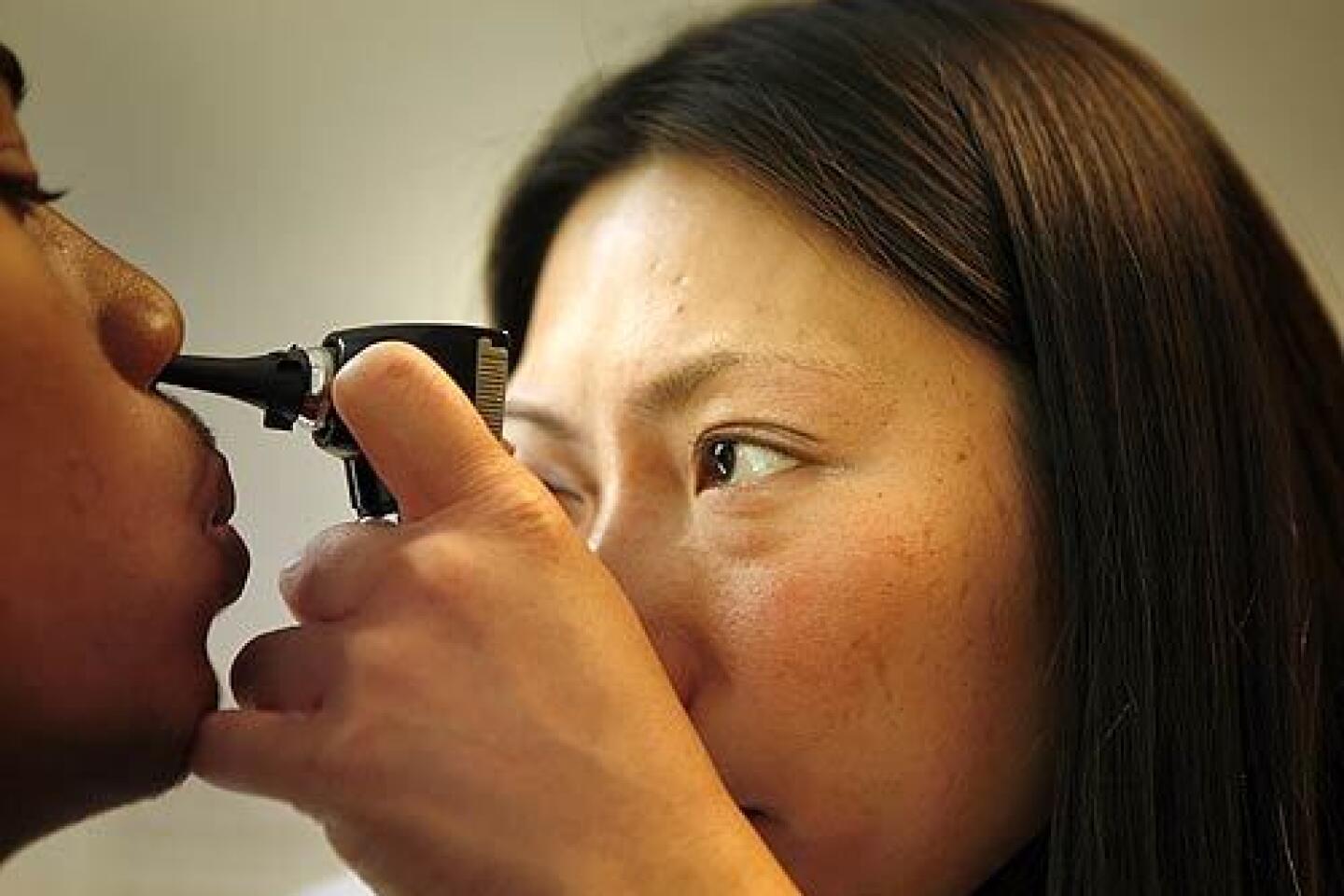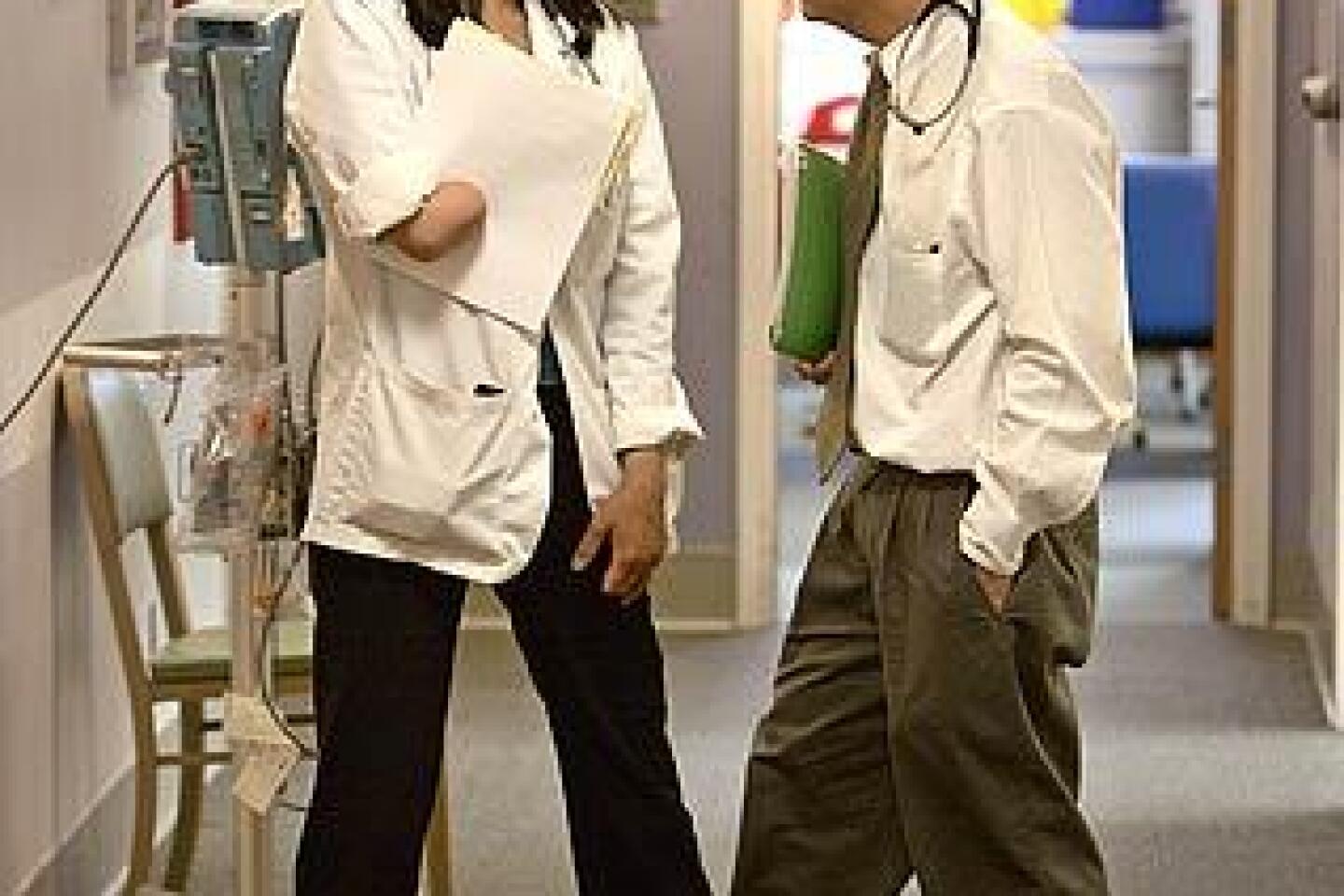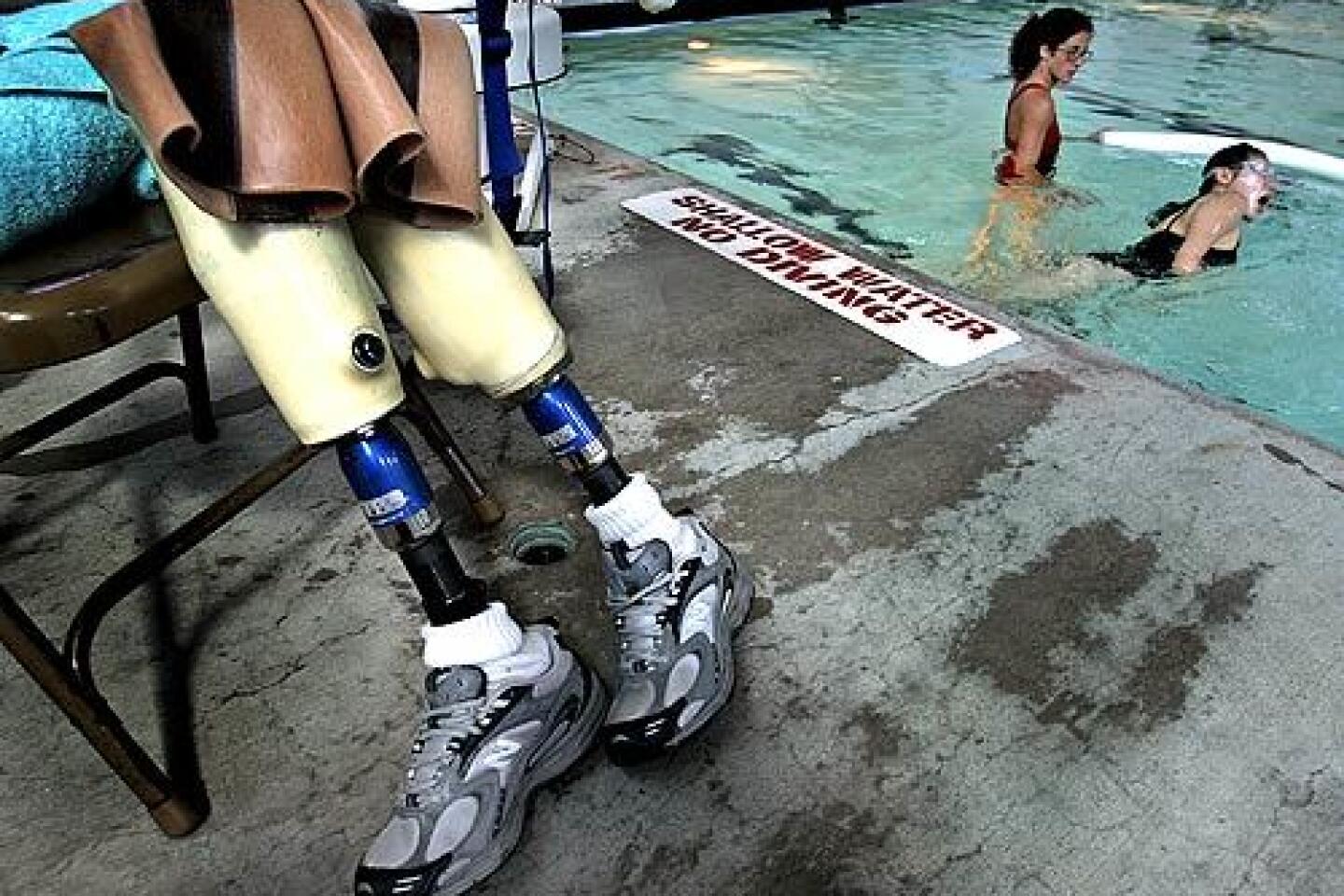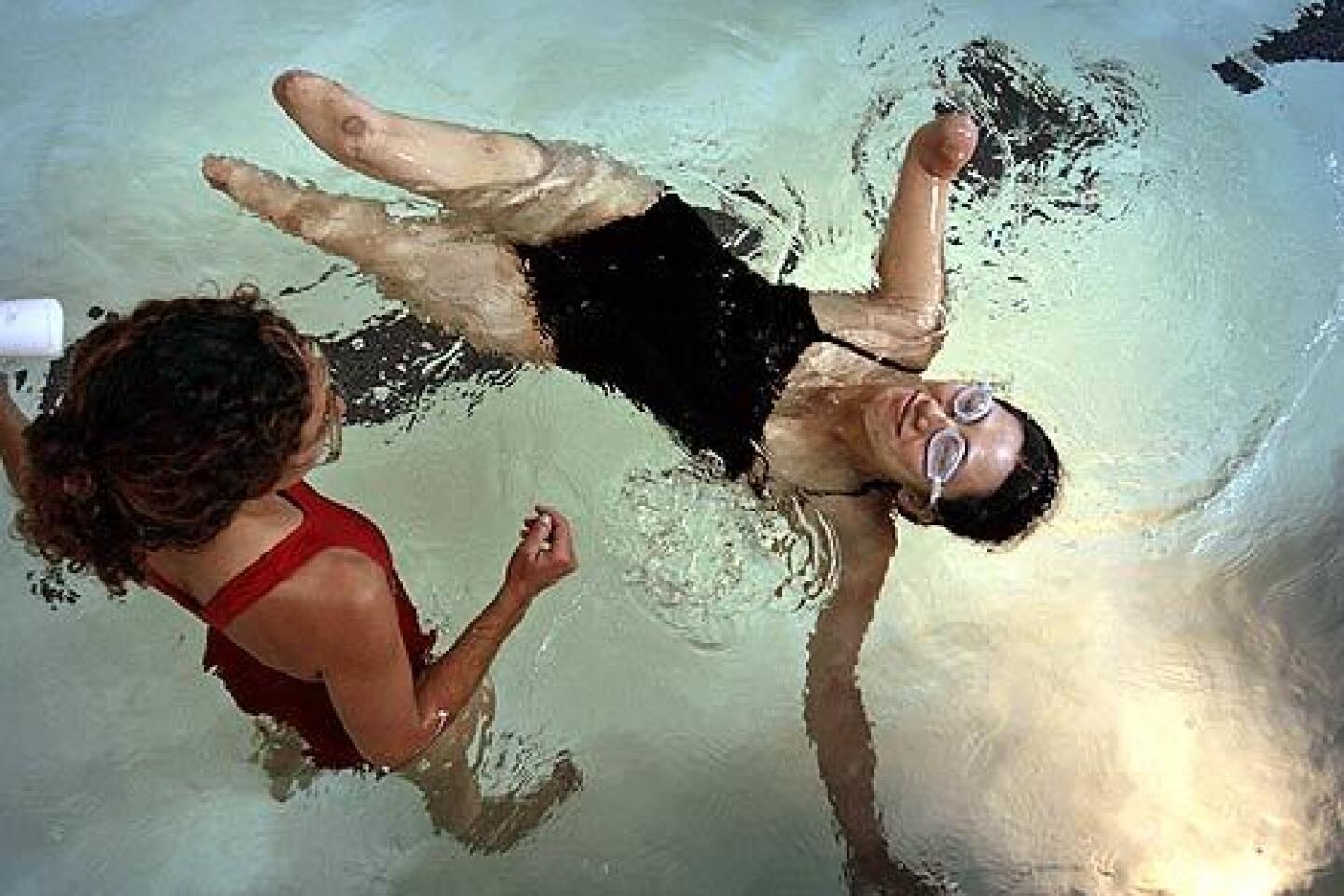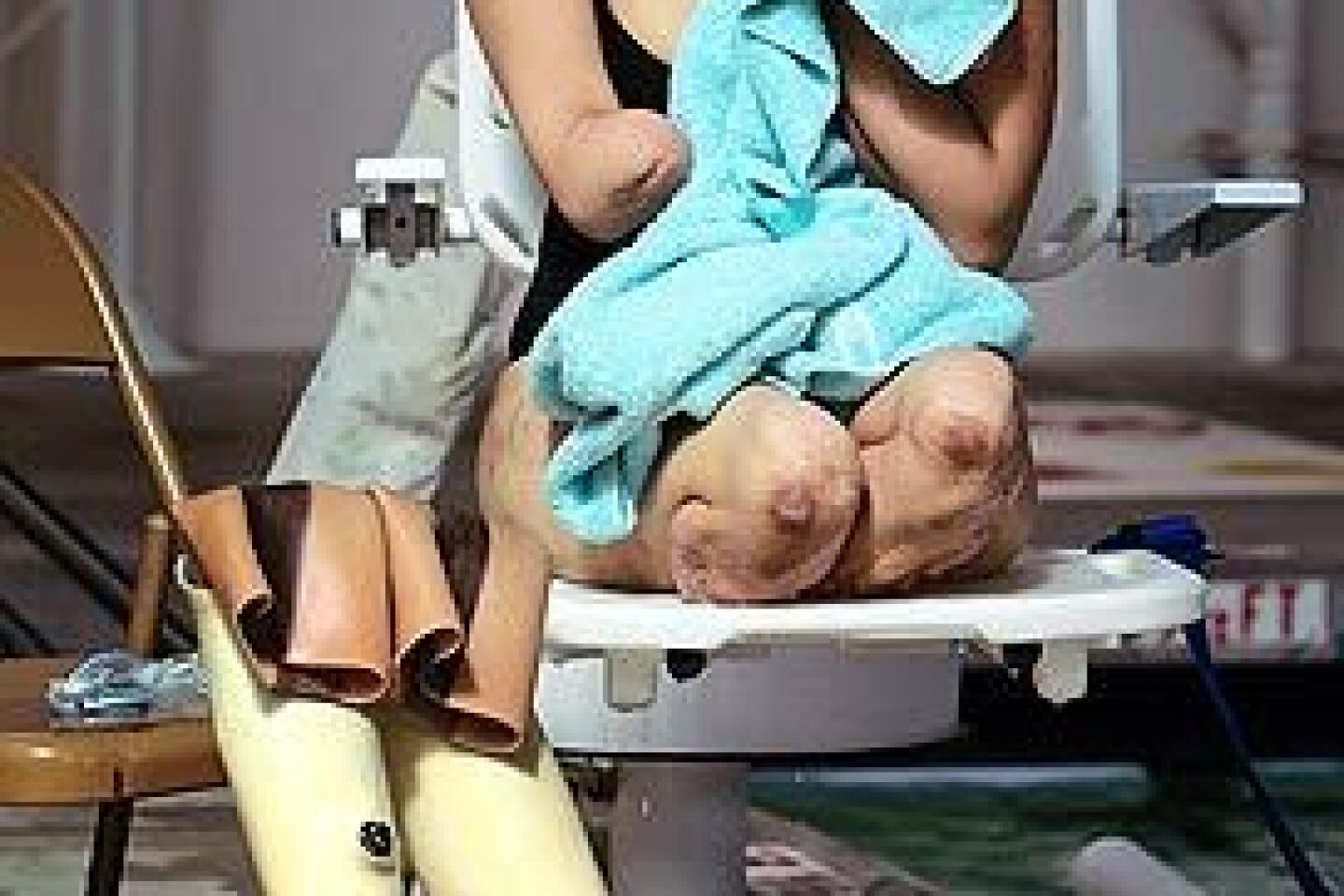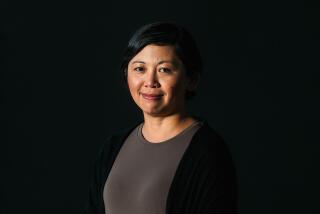Dream defies loss of limbs
Kellie Lim knows all too well what it is like to be a very sick child.
Struck with a ravaging bacterial infection that destroys limbs, she became a triple amputee at age 8 and soon faced a life of prosthetics, wheelchairs and often-painful rehabilitation.
But from that suffering, Lim forged a life of achievement. On Friday, she will graduate from UCLA’s medical school and then will begin a residency program at the medical center there.
Her chosen specialty? Pediatrics, with a possible concentration later on childhood allergies and infectious diseases.
“Just having that experience of being someone so sick and how devastating that can be — not just for me but for my family too — gives me a perspective that other people don’t necessarily have,” the 26-year-old Michigan native said recently.
And of all the topics she sampled during medical school, only her work with children left her “smiling at the end of the day.”
Lim carried out her medical training with a determination that awed her professors and fellow students and won her the school’s top prize for excellence in pediatrics.
Opting not to use a prosthetic arm, she showed that she can perform most medical procedures with one hand, including taking blood and administering injections. She lives on her own in a Westwood apartment with no special features for the handicapped and drives a car with only one adaptation: a turning knob on the steering wheel. She is learning to swim, is trying horseback riding and even went tandem skydiving recently.
Lim, whose legs were amputated about 6 inches below her knees, gave up her wheelchair years ago and walks so well down the long and crowded hospital hallways — with a slightly bouncy stride — that new classmates and patients often don’t have a clue for weeks that artificial limbs fill her shoes and pant legs.
She reluctantly will accept a seat during hospital bedside rounds when painful ulcers erupt on the skin that touches her prosthetics. (She has undergone grafts and additional surgeries over the years to help with the fittings.)
Colleagues say Lim’s calmness in a hospital’s hectic environment puts others at ease.
“With Kellie, at first you notice her hand is not there. But after about five minutes, she is so comfortable and so competent that you take her at face value and don’t ask questions so much. She has an aura of competence about her that you don’t worry,” said Dr. Elijah Wasson, who supervised Lim during a rotation in internal medicine at Olive View-UCLA Medical Center in Sylmar.
Lim attributes some of her gumption to her dreadful childhood bout of bacterial meningitis. The resulting toxic shock, with internal clotting and bleeding, wrecked her extremities, leading to the amputations. When she went back last year to the Michigan hospital to read her voluminous medical file, she found an evaluation stating that 8-year-old Kellie Lim had an 85% chance of dying of the meningitis.
Her parents urged her not to give up during her four months of hospitalization and the following years of rehabilitation. Just five months after she became sick, Lim returned to regular school in suburban Detroit.
Previously right-handed, she learned to write and do chores with her somewhat diminished left hand, having lost three fingertips on it to amputation, along with her entire right hand and forearm. She has been fitted with prosthetic arms, but does not wear one in public anymore and uses it at home just for rare tasks, such as assembling an IKEA desk by herself.
“I hate failing,” she said. “It’s one of those things that’s so ingrained in me.”
That view was intensified by another disability in the family. Her mother, Sandy, went blind in her 20s and, except for not driving, sought to continue as normal a life as possible in raising three children. She cooked, cleaned and walked the youngsters to school.
“She definitely was a great role model for me,” Lim said. “It was hard for her to overcome her blindness, and I think she definitely instilled a strength in me.”
Just before her mother’s death three years ago, Lim promised her that she would finish medical school — a pledge she will fulfill when she and her UCLA classmates take the Hippocratic oath.
“She wanted me to be a pediatrician,” Lim said, “and I know that somewhere out there, she knows I am going to be one.”
Lim is a soft-spoken, gracious woman, but she can be fierce in resisting being typecast as a disabled doctor who should focus just on rehabilitation medicine. She also is reluctant to accept what she sees as unnecessary assistance, even if it sometimes takes her longer than others to get things done.
Neil Parker, senior associate dean of student affairs at UCLA’s David Geffen School of Medicine, recalled how Lim resisted some of his early efforts to adapt or substitute medical equipment for her. “I think at the beginning we were perhaps a little at odds because I wanted to help her a lot with what I felt she needed,” he said. “She wanted me to help her, but only with what she was willing to use.”
In some cases, that meant finding older equipment, such as blood pressure cuffs that seemed better for a one-handed person, or practicing IV insertions.
One hurdle involved percussing, the lung exam done by placing one hand on a patient’s chest and using the other hand to tap on it. Parker suggested using a hand-held ultrasound machine, but Lim declined. Instead, Veterans Affairs experts in Westwood designed a short metal-and-plastic extender that Lim straps onto her residual limb to help with the tapping. It is not pretty, but it works fine.
Of course, Lim is not able to perform surgery or intubate a patient by herself. But those skills probably won’t be needed much in her likely fields. “There are certain things she can’t do, but there are a million things she can do,” Parker said.
Lim was assigned, on her final medical school rotation, to the pediatric allergy and immunology division under the supervision of Dr. Robert L. Roberts. On a recent Monday afternoon, she did the preliminary interviews and examinations by herself, deftly taking notes, pointing a light into ears, listening to hearts with a stethoscope.
She made no attempt to hide the residual limb, which she skillfully maneuvered to hold down papers; following medical protocol, she briskly washed the right limb and her left hand before touching patients or instruments.
First came a 14-year-old boy, who despite severe asthma, allergies, nosebleeds and migraines wants to play more baseball. He displayed the closedmouthed shrugging of boys his age, but his concerned mother detailed his middle-of-the-night breathing emergencies. Lim soon spotted evidence in his nose of inflamed tissue and recent bleeding. After a consultation with Roberts, the youth was prescribed a trial of new asthma medicine.
The boy’s mother, Karen St. Louis, said she and her family talked about the doctor during the drive home as a “phenomenal” role model: “The conversation was that you can do anything you put your mind to.”
Lim’s next patient that day was a heartbreaker: a 5-year-old girl born with severe immunodeficiencies and numerous other medical problems.
The tiny child, wearing a green pantsuit, white-and-pink sneakers and thick glasses, is not toilet trained and does not speak, though she seemed to understand what her mother told her in Spanish and English. Her parents, clearly devoted to her, worried about seizures she suffered during a recent vacation. The girl whimpered a bit while Lim examined her but did not resist. Roberts and Lim scheduled more testing.
With everything else going on, the girl’s parents seemed almost oblivious to Lim’s missing hand.
Out in the world, Lim’s partial arm sometimes attracts odd comments and stares, but her patients have shown overtly negative reactions only a couple of times, she said. Some small children were frightened by it and had to be soothed. Lim said she knows that some parents may be wary of her and that she will have to prove her competence.
“I’m not going to force myself on them in any way, but it still affects me personally,” she said. “It kind of wears you down a little bit.”
Still, Lim clearly identifies with the struggles of families with very ill youngsters.
“It is amazing to see family dynamics like that,” she said a few minutes after the girl left. “It’s very tragic, but the parents love their kids and will do anything for them and know so much about them.”
Her own parents, immigrants from China, loom large in her life. Besides stressing her mother’s influence, she thanks her father, Norman, a chemical engineer who kept the family going — financially and emotionally — through its unusual burdens.
Lim also credits her older sister, Nellie, who was protective of her and supportive of her moves toward independence, such as attending college away from home, at Northwestern University in Illinois.
Nellie Lim, now an attorney in Michigan, recalls the family philosophy:
“It wouldn’t do you any good to sit and cry about it. We just went on and kept doing what we had to do like any other family. You need to make dinner. Go to the basketball game. Go on vacation.”
Kellie Lim recently completed the last assignments for her medical degree and took a four-day pre-graduation celebratory Mexican cruise with classmates.
And this spring she began taking swimming lessons at a public pool in Westwood, even though she had been afraid of the water. During a recent session, Lim took off her prosthetic legs and was lowered into the water on a mechanized chair.
At first, Lim relied on a blue Styrofoam “noodle” to help her float. Then her coach took it away so Lim could practice a dolphin-like propulsion that used her torso, her one full arm and the remnants of her legs to move up the lane with a force that had some other swimmers doing double takes. It was tough work, but most of the time Lim was smiling.
More to Read
Sign up for Essential California
The most important California stories and recommendations in your inbox every morning.
You may occasionally receive promotional content from the Los Angeles Times.


